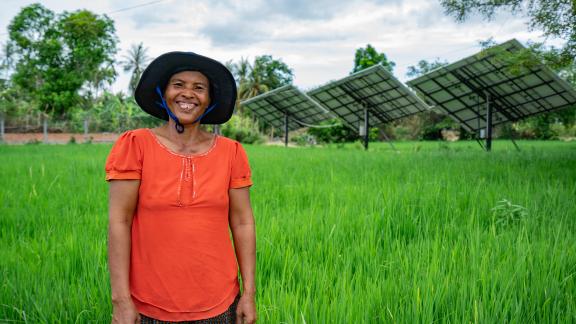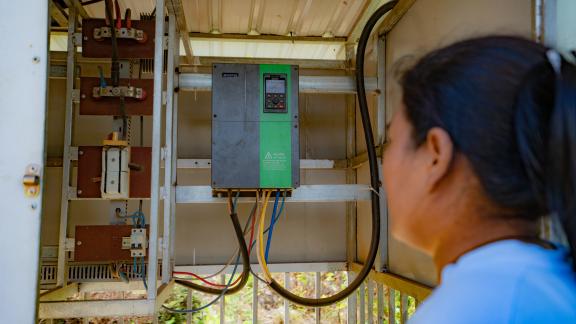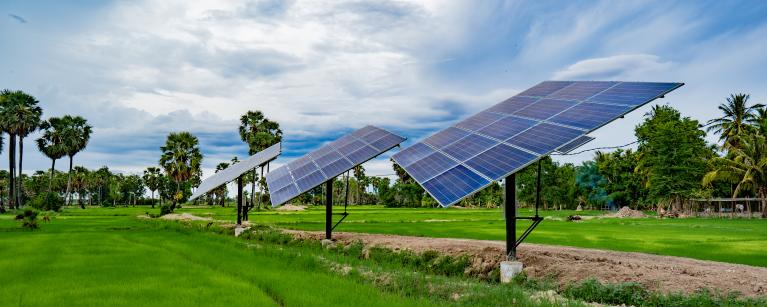The agricultural sector in Cambodia plays a vital role in the country’s economy, employing 37% of the workforce and contributing significantly to GDP. However, it faces challenges like rural-urban migration, labor shortages, and climate change.
In Pursat province, solar irrigation systems provide a sustainable solution for water supply issues, leading to increased yields, lower costs, and greater empowerment for women.
Farmers in Pursat province primarily cultivate rice with a well-established irrigation system that supports year-round production. Yet, they have limited access to modern farming techniques and vulnerability to natural disasters. In Kandieng district, insufficient water supply during dry seasons forces farmers to rely on expensive diesel pumps, causing disputes and environmental problems while placing additional caregiving burdens on women.
Ms. Thea Bou, a farmer in Kandieng district, emphasized the importance of water for agriculture, noting that without it, cultivation is impossible. She had to buy 120 liters of petrol, costing about 560,000 Riels ($140), to pump water for her rice field, with her husband helping to lift the machine.

Thea Bou standing in front of Solar Irrigation System in Kandieng district which is managed and operated by the local communities. Photo: Oxfam
Mr. Ra Sin, from a neighboring village, face similar high diesel costs spending over 500,000 Riels ($125) per harvest. Mr. Khut Lunh mentioned frequent issues with irrigation pumps, which sometimes broke down, leaving field without water for days and incurring high repair costs.
The adoption of solar-powered irrigation systems in Pursat province by Oxfam partner, Solar Green Energy (SOGE), has emerged as an effective alternative. Farmers highlighted advantages such as increased rice yield, higher incomes, longer cultivation cycles, more frequent farming opportunities, greater women’s participation, a cleaner environment, and a strengthened sense of community.
Ms. Thida Seng, a farmer and member of the solar-powered irrigation system committee in Kandieng district, shared her excitement about the positive changes in her community. She noted the absence of water-pumping noise and that now farmers have enough water for irrigation three times a year, with cost reduced to about 300,000 Riel ($75) per yield. Thida expressed joy in seeing women taking charge of the solar irrigation system and emphasized that farmers now need less external support, finding it gratifying to see this empowerment.
“I want all communities in our country to switch from using fuel-powered pumps to solar-powered systems. This way saves money and ensure a better water supply without the noise and smoke that disturb the environment.”
The experience in Kandieng district highlights the effectiveness of transitioning to solar-powered irrigation systems. This shift not only mitigates climate change by reducing CO2 emissions but also boosts local economic prospects. The implementation of solar-powered irrigation systems managed by the community promotes collaboration and increases women participation in agriculture and energy sectors. Thus, integrating renewable energy solutions into agriculture should be a priority for sustainable development in Cambodia.
Since June 2024, Oxfam and our partner SOGE have implemented a solar irrigation system in Battambang province. The goal is to assist 150 households in improving their farming practices. Funded by the Embassy of Ireland, community members will manage the system with technical support from SOGE, enhancing climate change resilience and local welfare.
The Royal Government of Cambodia is committed to transforming the energy landscape through the Power Development Masterplan 2022-2040, which aims for at least 70% renewable energy by 2030. This aligns with environmental goals and economic growth shifting from fossil fuel-based irrigation systems to renewable energy.
As the agricultural sector was the second-largest contributor to greenhouse gas emissions in 2016, prioritizing this shift could reduce emissions by nearly 42% by 2030 compared to business-as-usual scenarios.

Thida Seng, a farmer and member of the solar-powered irrigation system committee in Kandieng District turns on the solar power to irrigate the water, showing how easy the system is. Photo: Oxfam
